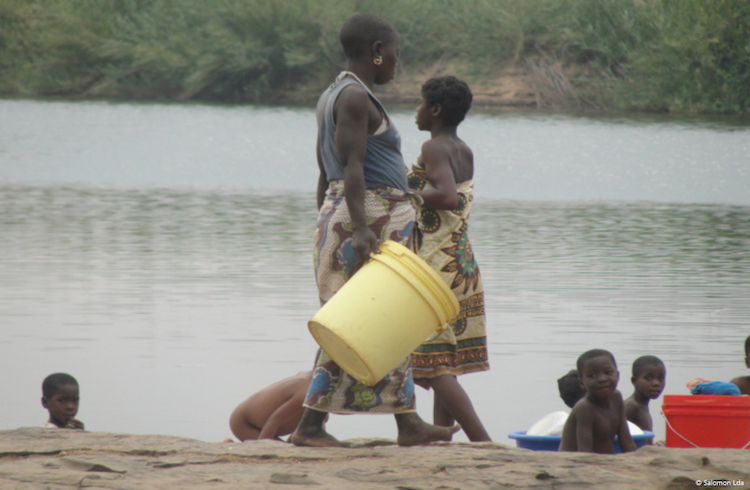
By Jeffrey Moyo
BLANTYRE, Malawi (IDN) – In Karonga, a district in the northern region of Malawi, 32-year old Mavis Banda, a mother of three daughters busies herself drawing safe drinking water from a borehole located at the heart of her village.
Banda and several other villagers claimed they long abandoned a local well where for years they drew water for domestic purposes, thanks to the initiative by the European Union (EU) ensuring developing African countries like Malawi access safe drinking water – as stipulated in Goal 6 of the UN Agenda 2030, which aims to “ensure access to water and sanitation for all”.
In Zimbabwe, the EU has even been more forthcoming in terms of combating water shortages in both rural and urban areas. Following the devastation in Zimbabwe caused by Cyclone Idai in March 2019, the European Union contributed EUR 250,000 (USD 281,035) to UNICEF to provide vital water, sanitation and hygiene (WASH) supplies to vulnerable children and families in flood-affected districts in the Southern African nation.
Cyclone Idai affected some 270,000 people (half of them children) in Zimbabwe’s districts of Chimanimani and Chipinge, in Manicaland Province, creating an immediate need for safe drinking water, sanitation facilities and hygiene materials.
The EU contribution supported the distribution of water purification tablets and soap to households, schools and health institutions, the rehabilitation and repair of critical water supply networks, and where needed, the drilling of boreholes and the construction of new water points.
“Our gratitude goes to the EU for often standing with us, especially during the Cyclone Idai disaster, making sure as a country we have access to clean water for drinking,” Zimbabwe’s Health Minister, Obadiah Moyo, told IDN.
Even the Zambian government has been of late upbeat about the EU assistance. In May 2019, the European Investment Bank (EIB) provided a five million Euro grant to help the country’s Mulonga Water and Sewerage Company (MWSC) implement the ‘Mulonga Peri-Urban Water and Sanitation Action’.
“The project is fully consistent with the Zambian Vision 2030 that sets the targets of 100 percent access to clean water provision by 2030,” said Zambia’s Finance Minister, Margaret Mwanakatwe.
The importance of EU’s support is underlined by the fact that Zambia’s ‘Copperbelt Province’, bordering on the Democratic Republic of Congo (DR Congo), is the second most populous region of the country, with around two million people, out of which 60 percent are estimated to live in low-income, peri-urban areas, where access to safe water remains typically below 40 percent.
“The EIB’s longstanding support to water sector on the African continent holds a significant contribution to the UN’s Sustainable Development Goals (SDGs), in particular in peri-urban, low-income areas,” said EIB Vice President Ambroise Fayolle.
In Malawi, where remote villagers like Mavis Banda hailing from Karonga district have benefitted from the EU gesture, the European Union earlier in 2019 invested a total of about EUR 15.750 million in Water & Sanitation projects in the Southern African nation.
Consequently, over the last five years the EU has provided access to safe drinking water for one million Malawians by way of its contribution to SDG 6.
“EU’s water investment in our country is significantly improving piped water and sanitation services for our people, especially those living in remote areas,” a top Malawian government official who requested to remain anonymous as he was not authorized to speak to the media, told IDN.
According to USAID, in Malawi, 80 percent of the country’s population of approximately 19 million people now has access to an improved source of drinking water. Still, USAID says, an estimated four million Malawians lack access to safe water while only six percent of the country’s population has access to an improved sanitation facility.
Not only has the EU chipped in help to Africa’s water-starved nations, but even other international organisations like the World Bank have also stepped in with aid to ease water scarcities blighting African countries.
Two years ago, up to 1.9 million Tanzanian citizens benefited from new financing approved by the World Bank from the International Development Association that was channeled towards the East African nation’s water sector, including 700,000 residents of the country’s largest city, Dar es Salaam.
Then, Tanzania’s newly approved financing amounted to USD 225 million that was aimed at supporting the strengthening of capacities for integrated water resources planning and management in that country as well as improve access to water supply and sanitation services in an efficient manner across Dar es Salaam.
Thanks to EU, this year in Nigeria, nearly 4,500 people in Riyom local government area of Plateau State, in the north-central part of the West African country, people benefitted from improved access to safe water and sanitation facilities which included gender segregated latrines.
In Nigeria, officials from the EU have been on record urging the significance of provision of water to communities there. “Clean water, basic toilets and good hygiene practices are critical for the survival and development of children. Without these basic needs, the lives of millions of children are at risk. We must do better for children by prioritizing WASH on the development agenda,” said Ambassador Ketil Karlsen, Head of EU Delegation in Nigeria.
According to the data from the WASH National Outcome Routine Mapping (WASH NORM), as many as 47 million Nigerians practice open defecation, with only 11 percent of Nigerians having access to complete basic water, sanitation and hygiene services. Meanwhile, 13 percent of schools have access to basic water and sanitation services in Nigeria.
But even though, for many Africans like Malawi’s Mavis Banda, with the EU moving in to facilitate the provision of clean water, it is relief time which many wish could stay for eternity. “I’m happy; I wish the whole of Malawi could continue like this, having clean water,” said Mavis. [IDN-InDepthNews – 21 July 2019]
Photo Source: Safe Water Africa. Credit: Salomon Lda (Mozambique)
IDN is flagship agency of the International Press Syndicate.
facebook.com/IDN.GoingDeeper – twitter.com/InDepthNews











